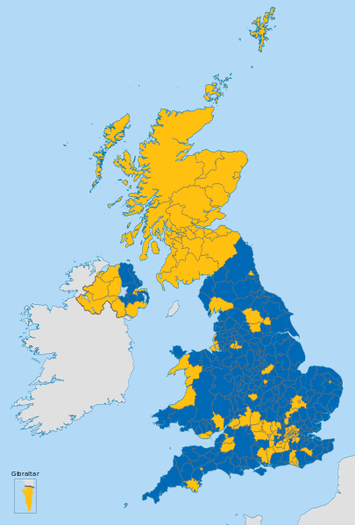
The famous shot heard “’round the world” this time came from the other side of the Atlantic, but its longtime impact could be equally profound. By voting to leave the European Union and its intrusive bureaucracy, the British people have also risen up against a regime of crony capitalism that has encumbered and perverted democracy across the entire Western world.
The implications, of course, are greatest for Britain and Europe, but they will affect politics here in North America. The Brexit raises to first priority the more general debate about the trajectory of global capitalism which, for all its many accomplishments, has grown to resemble, in its haughtiness and inbreeding, the very statist despotisms that it was supposed to overturn.
Brexit also represents a shot across the bow to all the elites, not only in Brussels, but also in Westminster, both left and right, much as the Sen. Bernie Sanders and Donald Trump campaigns have been here in the U.S. The EU pushed policies aimed at the mundane pleasures of the middle class, such as affordable electricity, cheap air travel, cars and single-family housing. Those who opposed the edicts were often excoriated as unenlightened and even racist. The “betters” behind the “Remain” campaign waged a kind of class struggle against the British grassroots – and lost in shocking fashion.
The Revolt of the Masses
As the American author Fred Siegel has suggested, at the root of this rebellion lie the attitudes of our cognitive betters. Over the past half-century, he argues in his book “Revolt Against the Masses,” progressivism has become increasingly haughty and dictatorial, reaching its apex in the Obama administration and its penchant for ruling by decree.
James Heartfield, a powerful thinker on Britain’s old left, described the vote as “a popular reaction against the elite.” The EU did not help its cause by failing to bring a long-promised prosperity to Europe. The recovery that did emerge somewhat in Britain largely benefited the asset-owning property and financial classes, the political base of David Cameron and his high-minded, politically correct brand of Toryism.
Read the entire piece at The Orange County Register.
Joel Kotkin is executive editor of NewGeography.com. He is the Roger Hobbs Distinguished Fellow in Urban Studies at Chapman University and executive director of the Houston-based Center for Opportunity Urbanism. His newest book, The Human City: Urbanism for the rest of us, will be published in April by Agate. He is also author of The New Class Conflict, The City: A Global History, and The Next Hundred Million: America in 2050. He lives in Orange County, CA.
Map by Mirrorme22Nilfanion: English and Scottish council areas TUBS: Welsh council areas Sting: Gibraltar [CC BY-SA 3.0], via Wikimedia Commons













Crony Capitalism?
Since Gary Johnson accused the EU of "Crony Capitalism" the other day, the internet has repeated the charge numerous times, usually to the effect that Brexit was a blow against billionaires by "the common man."
The problem is that when 'The Economist', or really anyone, ranks crony capitalists – individuals who earn their riches thanks to their chumminess with government, Britain is far and away the worst offender in the EU.
The vote was not at all a rejection of crony capitalism. Pure and simple, it was a rejection of the “asylum” rules in the EU (and Gemany in particular).
The vote immediately provided a boost to the nationalist parties in Europe, including France’s Front National, and Austria’s Freedom Party. But it is also a boost to the British Communist Party, who heavily supported Brexit.
These might seem like strange allies, but they aren't. Even though they are on two different sides of the "crony capitalism" debate, they share a mutual distrust of foreigners.
One of the saddest displays of honesty in modern politics was the supporters of "Leave" announcing that they had no means (or even motive) to live up to any of their major campaign promises.
This was sad not because it was so late (even though it was too late,) but because of the massive lack of response from the British public.
Think about that for a minute. The new prospective leader of the country announced that the average citizen would not be receiving any financial benefits from their vote, and hew knew that the announcement would not hurt him politically.
As long as people got to discriminate against foreigners, they could care less that crony capitalism would be preserved.